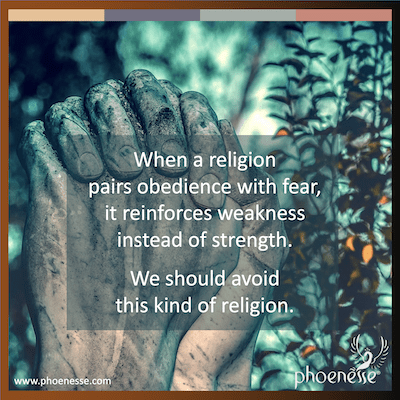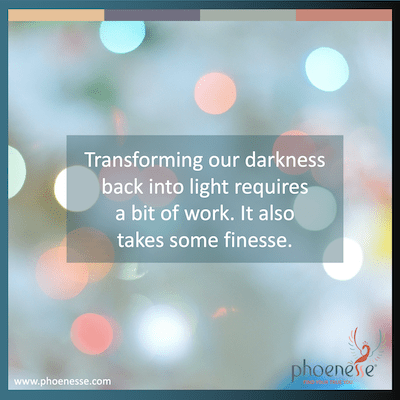
The short answer is no. We do not have to obey spiritual laws. It’s no different from human laws, where we also have the option to obey or not. We can speed if we want to. We can hurt other people, either intentionally or by accident. But of course, there are consequences to doing these things. In this respect, spiritual laws are just the same.
But there is an important way in which human laws and spiritual laws are very different. For in the case of human laws, we only pay the price for breaking them if we get caught. Spiritual laws, on the other hand, always work. Every time.
Like clockwork.
According the Pathwork Guide, there are an infinite number of spiritual laws. And they govern all of life as we know it. When we use our free will to align with them, happiness happens. When we go against them—and we are all free to do so—pain happens.
Pain, then, is the result of our own actions and attitudes. And it’s a pretty good motivator for obeying spiritual laws.
Still, that word “obey” doesn’t sit well with most of us. The problem isn’t that obedience is by nature unpleasant. The problem lies in knowing what and who to obey.
Why we are here
Let’s reflect for a moment on why we are here, having this human experience. It’s all about transforming our inner layers of darkness, or Lower Self, back into light. Then we must learn to let go of our ego and live from our inner light.
Easy to say; very hard to do.
Finding this inner light—which we could also call our divine self or Higher Self—is what all these teachings are pointing us toward. It’s also the direction that all spiritual laws are encouraging us to go.
These spiritual teachings, then, are showing us how to find our true selves and align ourselves with spiritual laws.
In the Pathwork Q&As about religion, the Guide explains that the trick, if you will, is that we have to learn to stop fighting ourselves. And we are constantly doing this. Due to this inner war going on inside of us, we make it impossible to discover the truth of who we are.
And who are we? In the center of our being, we are light. At our core, we are at peace, resting in an eternal state of being.
So how can we get more of that?
Why we fight ourselves
Sadly, one place that puts us sideways with our true self is organized religion. To be sure, there are aspects of truth in religion. But as happens with humans, the truth gets twisted. As a result, religion typically sets good and evil as two opposing forces.
This bit alone tends to set us in opposition to ourselves.
What, really, is the evil force? It is the undeveloped, instinctual aspects of our nature. In these immature parts of ourselves, there are both misunderstandings and arrested development. But that doesn’t make these parts “evil”, in the sense of being an unchangeable force that forever opposes life.
Too often, religions tend to pit this side of us against the “good” force, the meaning of which is also in distortion. In this view, being “good” means nothing more than obedience to a childish yet stern authority.
The end result? We will consider ourselves “good” if we obey and submit, behaving as a good little child. Yet this has absolutely nothing to do with our own divinity.
This is the fight so many people are locked in.
And it’s very destructive.
Religions reflect people
Why is such a concept of religion so widespread? Because it’s an outpicturing of what is going on inside us. In other words, the general religions of humanity reflect this tragic situation in which we do battle with ourselves.
Sure, we may be able to put on fake goodness. But when we do this, we are simply being a helpless, obedient little child who submits for the sake of getting approval. And this part is going to be at war with the parts of us that are still not very developed.
In truth, our undeveloped instinctual side is a lot closer to our inner divine self. That doesn’t mean we should go ahead and act out our undeveloped nature. But it does mean that this part of us is more real than any fake goodness.
For our lower nature holds the real energy of life. If, instead of battling this side, we would try to see it, accept it, and understand it—while learning to not impulsively act it out—we will find our way to our true God-self.
But first we have to stop denying it and fighting it.
How to trust what to obey
Let’s circle back to the topic of obeying. When we find, connect with, and start living from this inner light, we will start to become trustworthy people. Beyond this, we cannot have a genuine trust and belief in God as long as we do not trust and believe in ourselves.
Further, to the same degree that we can trust and believe in ourselves, we will also be able to trust other people.
All told, through the journey of self-discovery, we’ll find something worth obeying.
In the Pathwork Q&As on How to find God, the Pathwork Guide said, “So my advice is, do not search for God in churches or temples. Do not search for him through knowledge, books or teachings. Search for him in yourself and God will reveal himself. God is in you.”
We likely have some reasons to not trust ourselves, or to believe in ourselves. But if we follow this spiritual path, with all earnestness, we will eventually develop a very real and very healthy trust in ourselves. And that’s all we need to find God.
The wrong approach—the wrong kind of faith—is to cling to God because we don’t trust ourselves. This is a faith built on sand. It’s a false religion that pairs obedience with fear. It reinforces weakness instead of strength.
We should avoid this kind of religion.
But it’s not just religious denominations that play this destructive game. We can find it in plenty of people who aren’t part of any religion at all. This poison is subtle, and it’s everywhere.
Where do spiritual laws come from?
One could say that God is who created spiritual laws. But it would be more correct to say God is spiritual laws. They are kind and loving, letting us choose whether to follow them. More aptly, we get to choose how much pain we want to tolerate.
At some point, we each have to turn around and see the world as it truly is. It’s a place of both splendor and pain. Of taking responsibility for the state of our lives, and of learning to make better choices.
Whenever we act against our own best interests and follow the path of least resistance, we are following the way of our Lower Self, not the way of divine laws. And it’s our own choice to do this.
God has free will, so God gave us all free will. Without it, we could not return to living in God’s house. Because we wouldn’t be compatible with God.
To be clear, God will never take away our free will. But we humans do this to ourselves.
All day long.
–Jill Loree

The Guide’s wisdom in Jill Loree’s words


